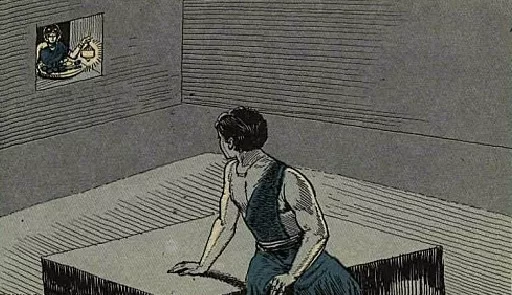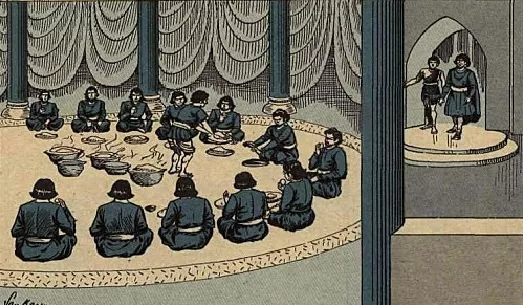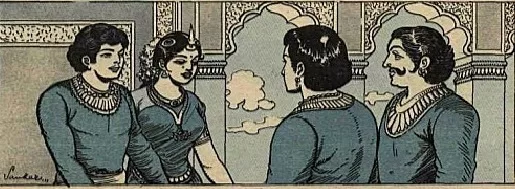The Story Of Yogesh
Through the ages, there have always been rulers who, drunk with their power, have endeavoured to usurp other domains.
And so it was many centuries ago when King Kamal of Samand longed to possess the prosperous neighbouring kingdom of Choudh, ruled by King Prasen, a rather weak-willed monarch.
But King Kamal decided that invading his neighbour would be too costly for his impoverished treasury, so he would have to resort to ‘cunning and treachery to achieve his ends.
So first, he challenged King Prasen to a chariot race for very high stakes, and under the code of chivalry, the challenge had to be accepted.
King Prasen sent for all the chariot makers in the kingdom and offered a large prize to the one who built him the fastest racing chariot.
Within a matter of days, all the chariots were ready for the King’s inspection, but although there were many fine chariots. one was outstanding for its sheer beauty and speed.
The chariot-maker was quick to come forward to accept the prize money, but he had little to do with the building of the chariot, which was designed by an apprentice named Yogesh, who received abysmal pay for the work he did.
When Yogesh learned that his chariot had won the prize, he hastened to join the crowd of courtiers admiring the chariot in front of the palace.
Yogesh overheard one of the King’s men proclaim loudly, “With the king’s white horses, this chariot will fly over the ground and leave King Kamal far behind.”
Yogesh cried, grasping the man by the arm, “I built this chariot and knew what it could do. But I must show the King’s horses, else the race will be lost.”
The King’s man did not know what to do with this excited youth, so he took him to the King, who had listened to Yogesh’s story, and let him fit his white horses with shoes.
When the chariot race was run the following day, it turned out to be a one-sided affair, with the crowd cheering King Prasen to an easy victory. King Kamal was furious and vowed to get even at any cost.
As a reward for his services, Yogesh was taken to the benefit of King Prasen and given money and fine clothes to wear.
Meanwhile, King Kamal fretting over his defeat, sent for an older woman named Malli, who was famed for her powers of witchcraft. He told the older woman she must devise a way in which he could defeat King Prasen.
“That’s simple,” muttered the old woman, “I will explain what you should do.”
Later, a messenger went to King Prasen’s palace, and when he was taken in front of KingKing, he announced, “Your Majesty, here are three sticks. of equal size; King Kamal challenges you to say which stick was cut from the tree first?”
“I will send the answer by sunrise tomorrow,” announced King Prasen, wondering how he could solve such a problem.
Yogesh was sent for, and when he was shown the three sticks, he smiled and said, “This is easy, just throw the sticks into the lake, and the stick that remains afloat the longest is the stick first cut from the tree.”
When King Kamal was given the correct answer, he sent for the old woman Malli in a towering rage: “How is it,” he shouted, “That King Prasen could solve your problem so easily?”
“It could not be King Prasen,” the old woman, scared for her life. “He must have found a clever adviser. But leave it to me, and I will find ways and means of getting rid of this clever adviser.”

The older woman disguised herself as a soothsayer and went to King Prasen’s court, where she was allowed to read King Prasen’s palm. She looked at King Prasen’s hand and gave a horrified gasp: “O king, you are in deadly peril; someone whom you trust is planning to murder you!”
KingKing was frightened and wondered who the villain could be. Ah! It must be Yogesh. So without thinking twice, KingKing ordered Yogesh to be arrested and buried alive that very day.
Stone masons hurried to build a tomb on the palace grounds to house the hapless Yogesh. As they were at work, Kings Prasen’s daughter. Princess Shoba happened to pass. Wondering at such feverish activity, the Princess called the headstone mason and asked what he was building in such haste.
“Your Highness, we are building a tomb,” said the mason with a shrug.”It’s for Yogesh, who is to be buried alive.”
The Princess was horrified, for she was very fond of Yogesh. Feeling sure that Yogesh could not be guilty of any foul crime, she gave the mason the jewels she was wearing and made him promise to leave one of the stone slabs loose.
That night, when all were asleep, the Princess slipped out of the palace with food for her poor Yogesh. Without much difficulty, she was able to move the loose stone slab. Yogesh, who was dead than alive, was amazed and delighted at the sight of the Princess. Between mouthfuls of food, he told the Princess that he had no idea why King had sent him to such a terrible death.

“Be of good cheer,” whis- pered the Princess, “I will find out who made my father do this to you. But you must stay here, and every night, I will bring you food and drink.”
When King Kamal heard of Yogesh’s fate, he was delighted. For now, he could challenge King Prasen and win the most straightforward wager.
Two weeks later, twelve young men, all very much alike, presented themselves before King Prasen and handed him” a letter from King Kamal. When King Prasen’s read the message, he turned to his chief minister in a fury.
“Listen to this,” he shouted, his hands trembling with rage.
“King Kamal challenged me to find the crown prince among these twelve youths. How do I know which is the prince when they all look alike?”
“But that is not all,” King Prasen continued, “King Kamal says that if I fail to select the right one within twenty-four hours, he will declare war on us!”
That evening Princess Shoba went to King Prasen’s, who was pacing up and down. His chamber was like a caged tiger, wondering what to do for the best.
“Father, I know that you are worried,” said the Princess,
“But first, why did you have Yogesh put to death?”
King Prasen’s turned to the Princess in anguish, “That was my great mistake. A witch cruelly misled me. Now I would give half my kingdom to have Yogesh here.”
The Princess said, “Why not break open the tomb to see if Yogesh is still alive?”
“No, my child,” he replied, “After all this time, Yogesh is bound to be dead.”
“You can at least make sure,” said the Princess.
The tomb was opened, and Yogesh was indeed well and hearty. King was dumbfounded but lost no time telling Yogesh of King Kamal’s ultimatum.
“But this is not difficult,” said Yogesh, “sit these twelve youths down to a sumptuous dinner but serve the food on dirty plates. The crown prince brought up royally will refuse to eat on a dirty plate.”

It was true; when the twelve youths sat down to dinner, one shouted at the servants to fetch him a. clean plate.
Now Yogesh advised King Prasen: “Having discovered the prince, hold him as a hostage, Then send an ultimatum to King Kamal that unless he pays homage to you and hands over Malli the witch, his son, the prince will be put to death.”
When this threat confronted King Kamal, he readily admitted defeat and lost no- time in grovelling at the feet of King Prasen to save his son’s life.
The older woman Malli was banished for life, and the day came when Yogesh married the Princess.
